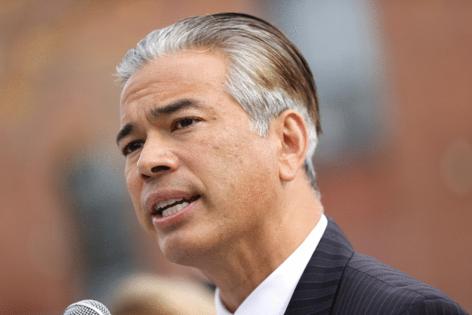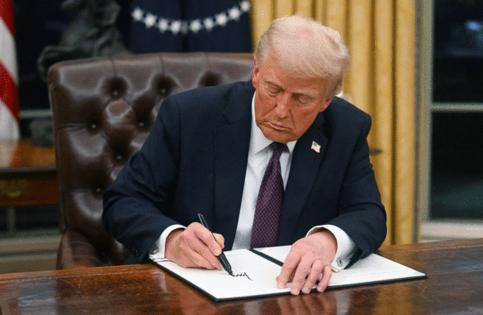Trump talks 'free speech' while moving to muzzle those he disagrees with
Published in Political News
In one of his first acts in office, President Trump issued an executive order promising to end government censorship and restore free speech.
The order accused the outgoing Biden administration of harassing social media companies and violating the rights of average Americans "under the guise" of combating disinformation online, and said federal resources would no longer be used to "unconstitutionally abridge the free speech of any American citizen."
The order echoed a recurring theme from Trump's campaign — that liberals across the federal government are censoring conservative voices to advance their own "woke" agenda — and immediately resonated with his followers.
"This order is a critical step to ensure the government cannot dictate what speech is permissible or weaponize private entities to enforce censorship," said Mark Trammell of the Center for American Liberty, a conservative rights group founded by California attorney Harmeet K. Dhillon, Trump's nominee to lead the Justice Department's Civil Rights Division.
However, many others said they found Trump's order absurd — both because of his long track record of attacking speech he doesn't like, and because of his new administration's simultaneous efforts to muzzle people it disagrees with, including journalists, federal health officials, teachers, diplomats, climate scientists and the LGBTQ+ community.
"Let's not be naive," said Hadar Harris, the Washington managing director of PEN America, which has advocated for free speech in the U.S. for more than a century. "While some of President Trump's flurry of executive orders pay lip service to free speech, in reality they frame a frontal assault against it, dictating the terms of allowable expression and identities, demanding political loyalty from civil servants, and threatening retaliation against dissent in ways that could cast a broad chill on free expression well beyond the halls of government."
California Atty. Gen. Rob Bonta said Trump's claiming to be a free speech champion while attacking the media and harshly restricting how longtime civil servants can communicate with the public — including in critical areas such as public health — was "ironic and hypocritical."
"It's classic Trump administration," Bonta said. "It's their rhetoric versus their actions, and you have to look at their actions."
Limiting communication
Both at home and abroad, the Trump administration has ordered federal employees and diplomats to cease communications on a range of issues, including "diversity, equity and inclusion," "environmental justice" and "gender ideology."
It ordered Department of Defense officials to stop posting information on official social media accounts unless it is about the southern border, and health and other federal experts to limit communications even on critical public safety issues such as the spread of bird flu — which California officials have declared an emergency.
Dr. Jeffrey Klausner, a public health professor and infectious-disease expert at USC, said he was alarmed Thursday when the Centers for Disease Control and Prevention withdrew from a planned bird flu discussion with the Infectious Disease Society of America. Klausner said their pulling out was "a big loss for our ability to understand what's going on" nationally.
Klausner said past administrations have given health leaders new orders — to curtail spending, shift priorities — but never such directives to halt so many critical communications at once. He called it "extremely concerning."
Trump also has ordered a sweeping crackdown on federal communications about the LGBTQ+ community — removing LGBTQ+ resource materials from government websites and placing new restrictions on how federal employees can discuss or speak to LGBTQ+ people — or even use words such as "sex" or "gender."
He has threatened similar restrictions on public school teachers and administrators, and ordered that LGBTQ+ Americans may no longer identify as transgender on passports and other documents.
Jenny Pizer, chief legal officer for the LGBTQ+ legal advocacy group Lambda Legal, said Trump's orders are "the antithesis of free speech" and a clear government attempt to "silence people, to chill speech" — which is illegal.
She pointed to new rules barring federal employees, contractors and materials from referencing gender identity or fluidity. "Those concepts are being censored, and the language with which one articulates the concepts is being censored," she said.
Lambda Legal has fought such efforts before. When Trump in 2020 issued an executive order barring federal grantees conducting workplace diversity training from referencing topics such as implicit bias or critical race theory — calling them "divisive concepts" — Lambda Legal and others sued and won an injunction blocking the order.
Trump has also kept up his criticism of the news media, calling journalists the "enemy of the people." He is suing various media organizations — including the board of the Pulitzer Prizes and the Des Moines Register and its parent company, Gannett — over journalism he claims was libelous or unfair. The outlets have defended their work.
Katherine Jacobsen, U.S. program coordinator at the Committee to Protect Journalists, said journalists would welcome an honest effort to bolster free speech protections across the political spectrum, but Trump's order isn't that.
"What we've seen in this post-election period — and even before the election kicked off, in his last presidency — is that he hasn't really been willing to support free speech when it counters his narrative," Jacobsen said.
Online debate
At the core of Trump's censorship order is his claim that the Biden administration "trampled free speech rights by censoring Americans' speech," including by "exerting substantial coercive pressure" on online platforms.
It is not a new argument.
After the Jan. 6, 2021, attack and multiple investigations into efforts by foreign adversaries to spread disinformation and sow distrust in the American political system, social media companies promised to crack down — including by suspending thousands of accounts. Under the Biden administration, officials kept up pressure on those platforms to take down posts the administration deemed false and dangerous, including about U.S. election integrity but also the COVID-19 pandemic.
Those efforts increasingly rankled Republicans and eventually Republican states sued, accusing the Biden administration of illegally coercing the platforms to erase conservative content.
Experts say claims of liberal bias on social platforms are generally overblown, and point to thriving conservative communities online as proof. However, surveys have shown that many conservatives believe that bias exists. And Meta's chief executive, Mark Zuckerberg, recently lent credence to the claims by complaining publicly and to Congress about pressure his company received from the Biden administration to remove or limit the spread of certain content, including satirical content about COVID-19.
Lawyers for the Biden administration have said there is a difference between legitimate persuasion and inappropriate coercion, and that communication channels between government and social media companies had to remain open for public safety reasons. The Supreme Court ruled in favor of the Biden administration in June, finding the states had no standing to sue. Litigation around the issue persists.
In the meantime, tech leaders were shifting away from moderation — and toward Trump.
Elon Musk, the richest man in the world, purchased the social media platform X — then Twitter — in October 2022 on a promise to make it more free. He has described himself as a "free speech absolutist" and said Twitter wasn't living up to its potential as a "platform for free speech" — which he said he would fix by loosening content restrictions.
Since then, Musk has joined Trump's inner circle, spent more than a quarter of a billion dollars to help reelect Trump and Republicans in Congress, and been appointed by Trump to lead a new agency called the "Department of Government Efficiency," raising all sorts of questions about conflicts given contracts Musk — also chief executive of SpaceX and Tesla — holds with the federal government.
Critics have also questioned Musk's commitment to free speech. He has kicked journalists covering him off X and amplified conservative talking points on the platform. In September, X disclosed it had suspended nearly 5.3 million accounts in the first half of last year, compared with 1.6 million accounts it suspended in the first half of 2022.
Earlier this month, Zuckerberg of Meta — which owns Facebook, Instagram and WhatsApp — announced his company had allowed for "too much censorship" and would be getting rid of fact-checkers, reducing content restrictions and serving up more political content.
Zuckerberg then went on the popular Joe Rogan podcast, where he said corporate America had been "neutered" and "emasculated" and complained bitterly about Biden administration officials calling Meta team members to demand they take down certain content — while "threatening repercussions if we don't."
A host of other tech leaders in addition to Musk and Zuckerberg — Amazon founder Jeff Bezos and the chief executives of Apple, Google and TikTok — were on hand for Trump's inauguration. Many also donated to the events.
Trammell, of the Center for American Liberty, said the Biden administration violated the rights of average Americans with such actions, and that Trump's order "reaffirms America's commitment to free expression." Rep. Jim Jordan, R-Ohio, who as chair of the House Judiciary Committee has overseen investigations into social media bias, noted the anti-censorship order, among others, in a post on X, writing, "Common sense is back!"
Harris, of PEN America, said her organization agrees that "government censorship of speech is intolerable in a free society," as Trump's order states, and that the government must "take care" in how it addresses things like disinformation on social media platforms "so as not to infringe on free speech."
However, the government "should be able to communicate and engage in information sharing with tech companies when disinformation is swirling online during a natural disaster, pandemic, foreign interference in an election, or other moment of heightened tension and risks to the public," Harris said.
While purporting to defend speech already protected by the First Amendment, Trump's order would make such necessary communication "impossible" and "limit the government's ability to address disinformation at all," Harris said — "giving disinformation free reign."
Speaking out
Kate Oakley, senior director of legal policy at the pro-LGBTQ+ Human Rights Campaign, said while there are some legitimate restrictions on free speech — you can't scream 'fire!" in a crowded theater, for example — the Constitution already protects American citizens from the sort of government censorship that Trump purports to target with his order.
It also protects them from some of the things Trump's other orders would usher in if implemented, she said.
"What he wants to do is make sure that speech or beliefs that are critical of him have less opportunity to be expressed, that speech or beliefs that are praising him have more ability to be out there, and to the extent that people are saying, doing, believing, reading things that he doesn't approve of, he would like to shut that down and is taking actions to do so," Oakley said.
But "our government does not get to tell us those things," Oakley said, and groups such as hers are going to be using their voice to argue that point vociferously — including, if necessary, in court.
Bonta, California's attorney general, said Trump is a "seasoned salesman" when it comes to saying one thing and doing another, but California will not be fooled and will also be calling out Trump's anti-free speech actions and those that threaten public safety.
Pizer, of Lambda Legal, said legal intervention from groups like hers may not come immediately, as some of the orders are "still amorphous or theoretical enough that we can't see what the effect will be." But they are watching closely, she said, and already see the pain.
"The reality," she said, "is that lovely, wonderful people who never did anything to hurt anybody are going to be suffering along the way as we try to shut this stuff down as fast as we can."
_____
(Times staff writer Tracy Wilkinson in Washington contributed to this report.)
_____
©2025 Los Angeles Times. Visit latimes.com. Distributed by Tribune Content Agency, LLC.































































Comments